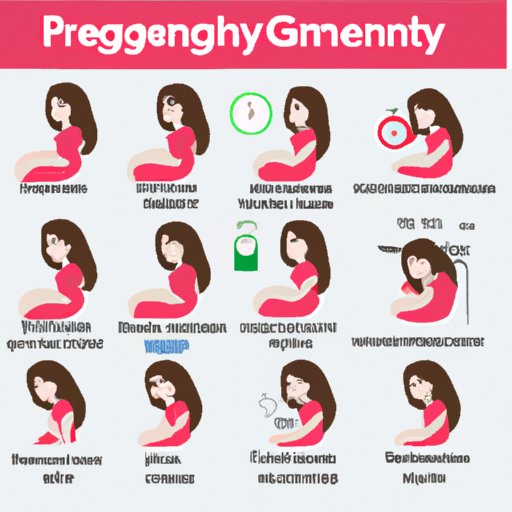
I. Introduction
Early pregnancy symptoms can be a telltale sign of one’s pregnancy status. While each woman’s experience can vary, it is essential to understand when one is expected to experience pregnancy symptoms. This article explores early pregnancy symptoms and what to expect – all while providing valuable information to maintain your peace of mind.
II. Exploring the Early Signs of Pregnancy: When Can You Expect to Experience Symptoms?
Early pregnancy symptoms usually begin to surface within a few days to weeks of conception. Some women report experiencing symptoms as early as a few days after conception. However, others may not experience anything until several weeks later. The timing and nature of symptoms vary from person to person.
It is worth noting that the hormone hCG (Human Chorionic Gonadotropin), which is produced during pregnancy, is responsible for some pregnancy symptoms. It triggers the ovaries to stop releasing mature eggs and instead produce progesterone to sustain the pregnancy. This sudden hormonal change can result in a range of pregnancy symptoms.
It is also essential to distinguish early pregnancy symptoms from premenstrual symptoms, as they can be very similar. Some women may experience mild cramping, bloating, breast tenderness, and mood swings during their menstrual cycle. Therefore, it is essential to track and compare these symptoms and see if they differ around the expected time of menstruation.
III. The Mystery of Early Pregnancy: Understanding the Timing and Nature of Symptoms
The onset and severity of these symptoms are influenced by several factors, such as age, genetics, lifestyle choices, and overall health status. As a result, every woman is different in how she experiences pregnancy and its symptoms.
Some women may also experience unique symptoms that are not typically associated with early pregnancy, such as headaches, backaches, and leg cramps. While these symptoms may be concerning, they can be a normal part of pregnancy for some women. However, it’s important to distinguish them from symptoms that may indicate a potential complication like ectopic pregnancy or miscarriage.
IV. Pregnancy Symptoms: A Timeline of What to Expect and When
A timeline can help expectant mothers track the symptoms that they may experience during pregnancy. Here is a detailed chart of significant pregnancy symptoms and when they may occur:
- Weeks 1-4: missed period, fatigue, mild cramping, spotting
- Weeks 5-8: nausea, vomiting, frequent urination, constipation, breast tenderness
- Weeks 9-12: fatigue, mood swings, visible weight gain, food cravings or aversions
- Weeks 13-16: increased energy, decreased nausea, round ligament pain, skin changes
- Weeks 17-20: fetal movement, shortness of breath, heartburn, swelling, anemia
- Weeks 21-24: leg cramps, Braxton Hicks contractions, stretch marks, vision changes
- Weeks 25-28: more fetal movement, shortness of breath, nestedness, insomnia, gestational diabetes test
- Weeks 29-32: fetal hiccups, backaches, swelling, bloating, contractions, pelvic pressure
- Weeks 33-36: fatigue, heartburn, backaches, increased vaginal discharge, low energy
- Weeks 37-40: effacement, baby “drops,” Braxton Hicks contractions, water breaks
V. From Nausea to Fatigue: What You Need to Know About the Onset of Pregnancy Symptoms
During pregnancy, women can experience a wide range of early symptoms. Here’s what you need to know about the most common ones:
Nausea and Vomiting
Up to 80% of pregnant women experience nausea and vomiting during pregnancy. It is typically more severe in the morning but can happen at any time of the day. Eating small meals, drinking plenty of fluids, and avoiding greasy foods can help reduce nausea.
Extreme Fatigue
Fatigue is common early in pregnancy, and it is often caused by an increased production of progesterone. It is essential to take frequent breaks, stay hydrated, and get adequate rest during this time.
Breast Tenderness
Breast tenderness and swelling can be some of the earliest symptoms of pregnancy. It is important to wear a supportive bra and avoid physical contact that could cause discomfort or added stress on breasts.
Mood Swings
Hormonal changes during early pregnancy can cause mood swings and irritability. It is essential to communicate with your partner or support system and speak to a healthcare provider if it is increasingly difficult to manage.
VI. When Will You Know You’re Pregnant? Understanding the Onset of Early Pregnancy Symptoms
Under normal circumstances, pregnancy tests are the most reliable way to confirm whether a woman is pregnant or not. These tests detect the presence of human chorionic gonadotropin (hCG) in urine or blood. Some early pregnancy symptoms, such as missed periods, nausea, and breast tenderness, can also suggest that a woman is pregnant. However, these symptoms cannot confirm pregnancy conclusively.
The earliest time to take a pregnancy test is after the missed period, as hCG levels are usually not detectable until then. However, some brands claim to be accurate up to five days before the missed period with their “early detection” tests. Be sure to read test instructions carefully before testing and follow your physician’s recommendations on confirmed testing.
VII. Conclusion
Pregnancy is an exciting time, and understanding what to expect can help women navigate the process with ease. Although every woman’s experience of pregnancy differs, by knowing what symptoms to anticipate, women can feel assured that they are taking care of themselves and their baby. Always consult a health professional if you suspect you’re pregnant or experience any concerning symptoms.





